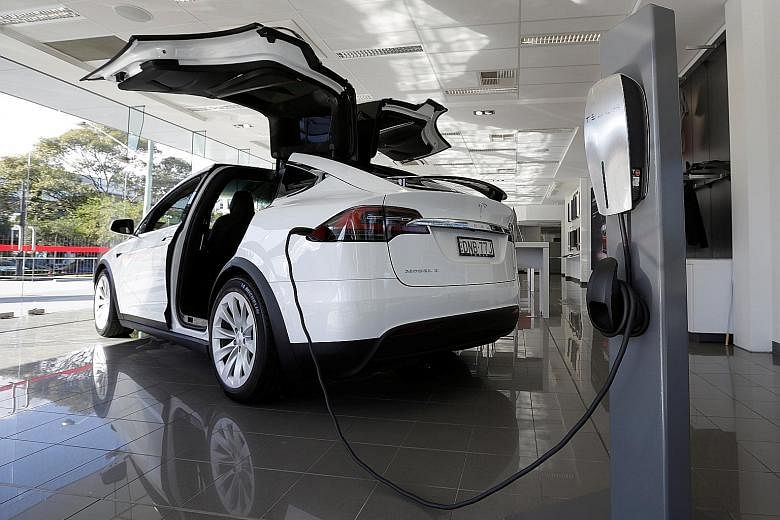As the world's carmakers place larger bets on electric vehicle technology, many industry analysts are debating a key question: How quickly can plug-in cars become mainstream?
The conventional view holds that electric cars will remain a niche product for many years, plagued by high sticker prices and heavily dependent on government subsidies.
But a growing number of analysts now argue that this pessimism is becoming outdated.
A new report from Bloomberg New Energy Finance, a research group, suggests that the price of plug-in cars is falling much faster than expected, spurred by cheaper batteries and aggressive policies promoting zero-emission vehicles in China and Europe.
Between 2025 and 2030, the group predicts, plug-in vehicles will become cost-competitive with traditional petroleum-powered cars, even without subsidies, and even before taking fuel savings into account.
Once that happens, mass adoption should quickly follow. "Our forecast does not hinge on countries adopting stringent new fuel standards or climate policies," said Mr Colin McKerracher, head of advanced transport analysis at Bloomberg New Energy Finance.
"It's an economic analysis, looking at what happens when the upfront cost of electric vehicles reaches parity. That's when the real shift occurs."
If that prediction pans out, it would have enormous consequences for the auto industry, oil markets and the world's efforts to slow global warming.
Last year, plug-in vehicles made up less than 1 per cent of new passenger vehicle sales worldwide, held back by high upfront costs.
The Chevrolet Bolt, produced by General Motors, sells for about US$37,500 (S$51,610) before federal tax breaks.
With petrol prices hovering around US$2 a gallon, relatively few consumers seem interested.
But there are signs of a shift.
Tesla and Volkswagen each have plans to produce more than one million electric vehicles a year by 2025.
On Wednesday, Volvo announced that it would phase out the traditional combustion engine and that all of its new models starting in 2019 would be either hybrids or entirely battery-powered.
Sceptics argue that these moves are mostly marginal.
Exxon Mobil, which is studying the threat that electric cars could pose to its business model, still expects that plug-in vehicle sales will grow slowly, to just 10 per cent of new sales in the United States by 2040, with little effect on global oil use.
The federal Energy Information Administration projects a similarly sluggish uptake.
The Bloomberg forecast is far more aggressive, projecting that plug-in hybrids and all-electric vehicles will make up 54 per cent of new light-duty sales globally by 2040, outselling their combustion engine counterparts.
The reason? Batteries.
Since 2010, the average cost of lithium-ion battery packs has plunged by more than one-third, to about US$300 a kilowatt hour.
The Bloomberg report sees that falling to US$73 by 2030 without any significant technological breakthroughs, as companies such as Tesla increase battery production in massive factories, optimise the design of battery packs and improve chemistries.
For the next decade, the report notes, electric cars will remain reliant on government incentives and sales mandates in places such as Europe, China and California in the US.
But as carmakers introduce a greater variety of models and lower costs, electric cars will reach a point where they can stand on their own.
Still, this outcome is hardly guaranteed. Governments could scale back their incentives before plug-in vehicles become fully competitive - many states are already beginning to tax electric cars.
Battery manufacturers could face material shortages or production problems that hinder their ability to slash costs.
And an unforeseen technology failure, such as widespread battery fires, could halt progress.
"But we tried to be fairly conservative in our estimate of where battery prices are going," Mr McKerracher said, "and we don't see barriers to electric vehicles becoming cost-competitive very soon."
Other experts caution that falling battery costs are not the only factor in determining whether electric cars become widespread.
Mr Sam Ori, executive director of the Energy Policy Institute at the University of Chicago, noted: "People don't buy cars based solely on the price tag."
Consumers may remain wary of vehicles with limited range that can take hours to charge.
Even though researchers have shown that battery-electric vehicles have sufficient range for many people's daily commuting habits, consumer psychology is still difficult to predict.
The report does not, for instance, expect electric vehicles to catch on widely in the pickup-truck market.
Charging infrastructure is another potential barrier.
Although cities are starting to build thousands of public charging stations - and Tesla is working on reducing the time it takes to power a depleted battery - it still takes longer to charge an electric vehicle than it does to refuel a conventional car at the pump.
Many owners charge their cars overnight in their garages, but that is much harder for people living in cities who park their cars on the street.
As a result, the Bloomberg report warns that plug-in vehicles may have a difficult time making inroads in dense urban areas and that infrastructure bottlenecks may slow the growth of electric vehicles after 2040.
If Bloomberg's forecast proves correct, it could have sweeping implications for oil markets.
The report projects that a sharp rise in electric vehicles would displace eight million barrels of transportation fuel each day. The world consumes about 98 million barrels a day.
A number of oil companies are grappling with the prospect of an eventual peak in global demand, with billions of dollars in investments at stake in getting the timing right.
Mass adoption of electric cars could also prove a key strategy in fighting climate change - provided the vehicles are increasingly powered by low-carbon electricity, rather than coal.
The International Energy Agency has estimated that electric vehicles would have to account for at least 40 per cent of passenger vehicle sales by 2040 for the world to have a chance of meeting the climate goals outlined in the Paris agreement, keeping total global warming below 2 deg C.
NYTIMES

